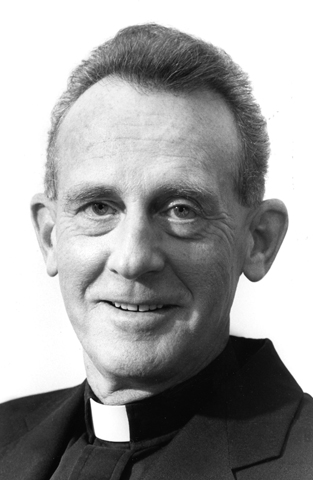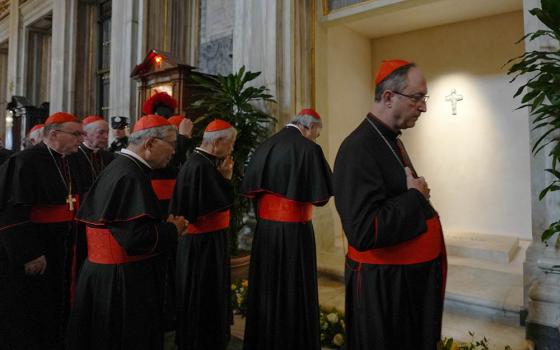
Bishop Raymond W. Lessard in an undated photo. (CNS)
A funeral Mass will be celebrated Jan. 12 at St. John the Baptist Cathedral in Savannah for retired Bishop Raymond W. Lessard, who died Jan. 3 at his residence at St. Vincent de Paul Seminary in Boynton Beach, Fla. He was 85.
Lessard, who was 42 when he was ordained bishop of Savannah in 1973, served as diocesan bishop until 1995, resigning because of health reasons, as chronic back problems made travel throughout the diocese more difficult.
After his retirement from active ministry, he taught ecclesiology and theology at St. Vincent de Paul Seminary.
Lessard, who worked at the Vatican's Congregation for Bishops from 1964 to 1973, noted how issues of collegiality still were unresolved in 2005, 40 years after the Second Vatican Council closed. Collegiality, he said in an interview with Catholic News Service, is at the heart of "the ongoing question of the relationship between the local and the universal church, which brings up a host of questions: centralization, the [Vatican] bureaucracy running things too much, but there's also the other extreme of isolationism of a local church -- the local bishop, for example, being too autonomous and independent."
He said that underlying the notion of collegiality is the understanding of the church as a communion of the people of God. To the early Christian theologians, what was important about that communion was "how it is felt and lived," Lessard said. To make collegiality a living reality in the church "[Pope] Paul VI was quite determined to carry out the conciliar directives," he added. "I'm thinking now on the practical level of the initiatives he took by extending faculties to bishops for things they were restricted from doing before, and of course of the development of national [bishops'] conferences."
Lessard, a native of Oakwood, North Dakota, was ordained to the priesthood in Rome in 1956.
"Bishop Lessard was certainly a gift to the church and to the diocese," Bishop Gregory J. Hartmayer of Savannah said in a Jan. 4 statement. "He will be remembered for his wit, his intellect and his compassion especially, among the priests and religious of the diocese."
Retired Bishop J. Kevin Boland of Savannah, who succeeded Lessard, told the Savannah Morning News that his recollection of the North Dakota native as being a "very young bishop, one of the youngest bishops in the United States" at the time. The two worked closely together and became "very good friends," Bishop Boland said, adding that his predecessor was a "very good teacher."
In 1992, Lessard was one of five Southern bishops who issued a pastoral letter opposing the death penalty. Capital punishment "often, in the name of justice, betrays justice and snares people in the trap of violence," the document said. "The respect with which we are bound to revere every human life as God's creation calls us to stand against the death penalty as a right and proper punishment for crime," the bishops said in a cover letter accompanying their pastoral letter.
Also that year, the Savannah Diocese celebrated the 500th anniversary of the establishment of what is believed to be the first permanent Christian mission in this part of the New World in part with a closing Mass at St. Simons Island with Lessard as the main celebrant.
In 1989, he was one of three bishop concelebrants for a Mass outside a nuclear submarine base near St. Marys, Georgia, where 71 people were arrested marking the sixth anniversary of the U.S. bishops' pastoral letter, "The Challenge of Peace: God's Promise and Our Response."
Lessard served 1989-91 as secretary of the U.S. bishops after the incumbent, then-Archbishop William W. Keeler, was elected vice president in the middle of his term. He was also part of a task force in 1990 to consider nutrition and hydration guidelines for patients in a persistent vegetative state, and a drafting committee in 1989 for a statement on AIDS. He also served one term as chairman of the U.S. bishops' Committee on Doctrine in the late 1980s when it was preparing a statement on bishop-theologian relations.
He also served on ARCIC II, the Anglican-Roman Catholic International Commission.


